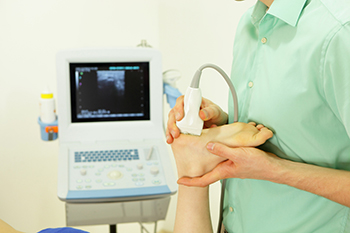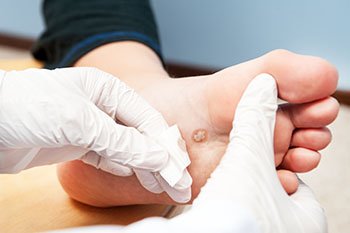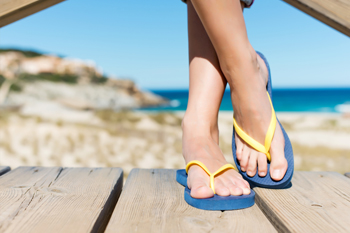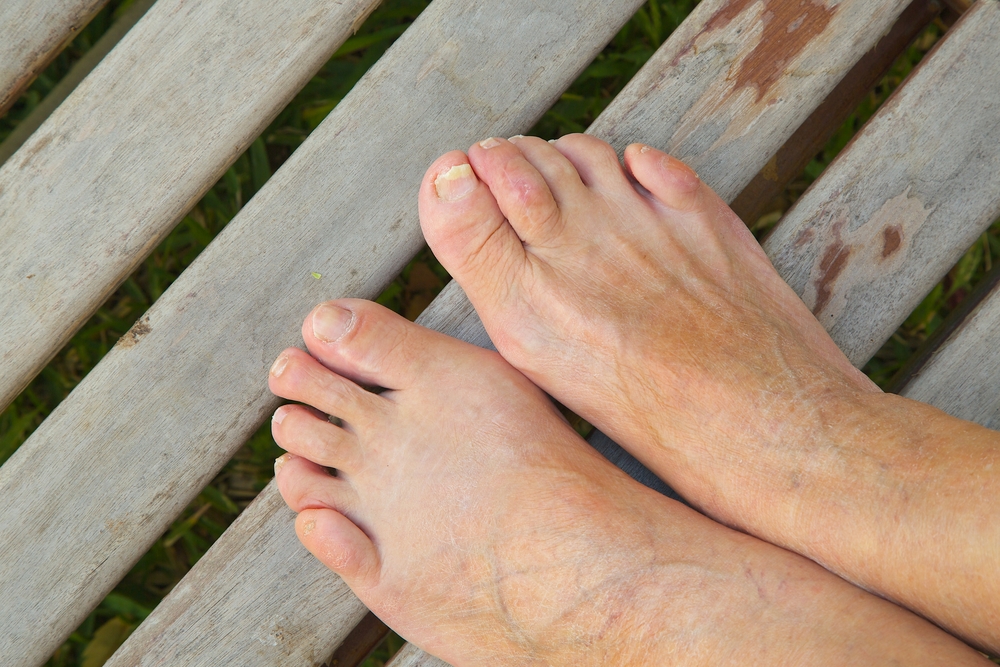Items filtered by date: July 2021
Flip-Flops and Wet Feet
Flip-flops are common beach and pool footwear, and if you’ve ever worn flip-flops to these places, you’ve likely worn them while your feet are wet. Although flip-flops leave most of your foot exposed, allowing it to air dry, walking around with wet feet in wet flip-flops can be quite dangerous. Wet flip-flops are more likely to slip off your foot, often coming off entirely while you walk. This can lead to a whole host of injuries, from getting a splinter in your foot from the boardwalk to twisting and spraining your ankle. Keeping the flip-flops on the feet while walking is difficult even under dry conditions, but when the shoes or feet are wet, it becomes a Herculean task. To keep flip-flops on the foot, you must scrunch up your toes in an awkward position. Over time, this can cause joint stiffness and hammertoes to develop. If you intend to wear flip-flops to the beach or pool, be sure to thoroughly dry your feet and the shoes prior to slipping them on. For more information about the relationship between footwear and the health of your feet, consult with a podiatrist.
Flip-flops are not always the best choice of footwear. If you have any concerns about your feet or ankles, contact one of our podiatrists from Pennsylvania. Our doctors will assist you with all of your foot and ankle needs.
Flip-Flops and Feet
When the weather starts warming up, people enjoy wearing flip-flops. Flip-flops are comfortable, stylish, and easy to slip on and off; they're perfect for any summer beach goer. However, these shoes can cause harm to the feet.
How Can Flip-Flops Affect Me Long-Term?
- Ankle problems
- Hip problems
- Lower back problems
- Pain in the balls of the feet
- Problems with foot arches
- Changes in the way you walk
Are There Injuries Associated with Flip-Flops?
Yes. Since flip-flops are relatively weak and do not provide the same amount of support as sneakers, people who wear flip-flops regularly are more susceptible to injuries. On top of that, the open nature of the shoe makes your feet more prone to other problems, such as cuts and even infections. Common injuries and ailments include:
- Sprained ankles
- Blisters
- Infections
- Cuts and Scrapes
I like Wearing Flip-Flops. Are There Safe Alternatives?
When buying flip-flops, try to find ones that have sturdy soles and that are made of high-quality materials that will support for your feet. These flip-flops will cost more but will also last longer as a result.
If you have any questions please feel free to contact one of our offices located in Plymouth Meeting and Ambler, PA . We offer the newest diagnostic and treatment technologies for all your foot and ankle needs.
Vascular Testing For Peripheral Artery Disease
 Poor circulation in the lower limbs can be a sign of peripheral artery disease (PAD). This is a serious condition that can cause leg cramps, muscle weakness, numbness, tingling, foot and ankle wounds, and difficulty walking. Older individuals and those with a history of cardiovascular problems are said to be particularly at risk. Your podiatrist can play a major role in detecting, diagnosing, and helping you manage PAD. Podiatrists can perform diagnostic vascular tests in the clinic. These tests are safe and noninvasive ways to assess blood flow in your lower limbs. Frequently used tests include the Ankle-Brachial Index test and Doppler ultrasonography. To learn more about PAD and to get tested, schedule an appointment with a podiatrist near you.
Poor circulation in the lower limbs can be a sign of peripheral artery disease (PAD). This is a serious condition that can cause leg cramps, muscle weakness, numbness, tingling, foot and ankle wounds, and difficulty walking. Older individuals and those with a history of cardiovascular problems are said to be particularly at risk. Your podiatrist can play a major role in detecting, diagnosing, and helping you manage PAD. Podiatrists can perform diagnostic vascular tests in the clinic. These tests are safe and noninvasive ways to assess blood flow in your lower limbs. Frequently used tests include the Ankle-Brachial Index test and Doppler ultrasonography. To learn more about PAD and to get tested, schedule an appointment with a podiatrist near you.
Vascular testing plays an important part in diagnosing disease like peripheral artery disease. If you have symptoms of peripheral artery disease, or diabetes, consult with one of our podiatrists from Pennsylvania. Our doctors will assess your condition and provide you with quality foot and ankle treatment.
What Is Vascular Testing?
Vascular testing checks for how well blood circulation is in the veins and arteries. This is most often done to determine and treat a patient for peripheral artery disease (PAD), stroke, and aneurysms. Podiatrists utilize vascular testing when a patient has symptoms of PAD or if they believe they might. If a patient has diabetes, a podiatrist may determine a vascular test to be prudent to check for poor blood circulation.
How Is it Conducted?
Most forms of vascular testing are non-invasive. Podiatrists will first conduct a visual inspection for any wounds, discoloration, and any abnormal signs prior to a vascular test.
The most common tests include:
- Ankle-Brachial Index (ABI) examination
- Doppler examination
- Pedal pulses
These tests are safe, painless, and easy to do. Once finished, the podiatrist can then provide a diagnosis and the best course for treatment.
If you have any questions, please feel free to contact one of our offices located in Plymouth Meeting and Ambler, PA . We offer the newest diagnostic and treatment technologies for all your foot care needs.
Do Your Child's Feet Hurt?
The Progressive Foot Disorder Known as Hammertoe
A hammertoe occurs when the middle joint in a toe is stuck in a bent position and the toe curls down, rather than laying flat. This deformity can develop in any toe other than the big toe. An imbalance in the muscles or tendons in the feet can lead to a hammertoe forming over time. Genetics may predispose certain people to hammertoes, which can be brought on by wearing pointy, narrow high heels. Having bunions, or certain diseases such as Charcot-Marie-Tooth, diabetes, or arthritis, can also contribute to the development of a hammertoe. In the early stages, the contraction is flexible and the toe can still move. In time, the bent toe can become rigid as the condition progresses. That is why it is important to seek the care of a podiatrist in the early stages, when more conservative therapies can be deployed to correct the deformity without surgery.
Hammertoes can be a painful condition to live with. For more information, contact one of our podiatrists of Pennsylvania. Our doctors will answer any of your foot- and ankle-related questions.
Hammertoe
Hammertoe is a foot deformity that occurs due to an imbalance in the muscles, tendons, or ligaments that normally hold the toe straight. It can be caused by the type of shoes you wear, your foot structure, trauma, and certain disease processes.
Symptoms
- Painful and/or difficult toe movement
- Swelling
- Joint stiffness
- Calluses/Corns
- Physical deformity
Risk Factors
- Age – The risk of hammertoe increases with age
- Sex – Women are more likely to have hammertoe compared to men
- Toe Length – You are more likely to develop hammertoe if your second toe is longer than your big toe
- Certain Diseases – Arthritis and diabetes may make you more likely to develop hammertoe
Treatment
If you have hammertoe, you should change into a more comfortable shoe that provides enough room for your toes. Exercises such as picking up marbles may strengthen and stretch your toe muscles. Nevertheless, it is important to seek assistance from a podiatrist in order to determine the severity of your hammertoe and see which treatment option will work best for you.
If you have any questions, please feel free to contact one of our offices located in Plymouth Meeting and Ambler, PA . We offer the newest diagnostic and treatment technologies for all your foot care needs.
Finding Work Shoes for Plantar Fasciitis
If you have plantar fasciitis, an inflammation of the ligament that runs along the bottom of the foot, then you are likely no stranger to heel and arch pain. This problem can be exacerbated by wearing the wrong shoes, especially if you work in a job that requires prolonged standing or walking. When shopping for work shoes, you should look for shoes that offer arch support, which will help evenly distribute your weight across the foot and reduce pressure on the plantar fascia. Shoes with cushioned insoles can provide extra support. You might also want to look for shoes that are made of a durable material and have a slip-resistant grip. These can both decrease the risk of further injury. If you are experiencing plantar fasciitis pain, it is suggested that you consult with a podiatrist, who can offer further treatment options, such as custom orthotic inserts or footwear.
It is important to find shoes that fit you properly in order to avoid a variety of different foot problems. For more information about treatment, contact one of our podiatrists from Pennsylvania. Our doctors will treat your foot and ankle needs.
Proper Shoe Fitting
Shoes have many different functions. They cushion our body weight, protect our feet, and allow us to safely play sports. You should always make sure that the shoes you wear fit you properly in order to avoid injuries and deformities such as: bunions, corns, calluses, hammertoes, plantar fasciitis, stress fractures, and more. It is important to note that although a certain pair of shoes might be a great fit for someone else, that doesn’t mean they will be a great fit for you. This is why you should always try on shoes before buying them to make sure they are worth the investment. Typically, shoes need to be replaced ever six months to one year of regular use.
Tips for Proper Shoe Fitting
- Select a shoe that is shaped like your foot
- Don’t buy shoes that fit too tight, expecting them to stretch to fit
- Make sure there is enough space (3/8” to ½”) for your longest toe at the end of each shoe when you are standing up
- Walk in the shoes to make sure they fit and feel right
- Don’t select shoes by the size marked inside the shoe, but by how the shoe fits your foot
The shoes you buy should always feel as good as they look. Shoes that fit properly will last longer, feel better, and improve your way of life each day.
If you have any questions, please feel free to contact one of our offices located in Plymouth Meeting and Ambler, PA . We offer the newest diagnostic and treatment technologies for all your foot care needs.
An Overview of Plantar Warts
 Plantar warts are benign skin growths that occur on the soles of the feet due to a human papillomavirus (HPV) infection. HPV can get into the feet through a tiny crack in the skin and make the top layer of skin grow rapidly, thereby creating a wart. Warts on the bottom of the feet may be asymptomatic, or they may cause pain or discomfort while standing or walking due to pressure on the bottom of the foot. Plantar warts can typically be diagnosed through a physical examination and can be treated through medications, cryotherapy, or surgical removal. If you have plantar warts, consult with a podiatrist to find the right treatment for you.
Plantar warts are benign skin growths that occur on the soles of the feet due to a human papillomavirus (HPV) infection. HPV can get into the feet through a tiny crack in the skin and make the top layer of skin grow rapidly, thereby creating a wart. Warts on the bottom of the feet may be asymptomatic, or they may cause pain or discomfort while standing or walking due to pressure on the bottom of the foot. Plantar warts can typically be diagnosed through a physical examination and can be treated through medications, cryotherapy, or surgical removal. If you have plantar warts, consult with a podiatrist to find the right treatment for you.
Plantar warts can be very uncomfortable. If you need your feet checked, contact one of our podiatrists from Pennsylvania. Our doctors will assist you with all of your foot and ankle needs.
About Plantar Warts
Plantar warts are the result of HPV, or human papillomavirus, getting into open wounds on the feet. They are mostly found on the heels or balls of the feet.
While plantar warts are generally harmless, those experiencing excessive pain or those suffering from diabetes or a compromised immune system require immediate medical care. Plantar warts are easily diagnosed, usually through scraping off a bit of rough skin or by getting a biopsy.
Symptoms
- Lesions on the bottom of your feet, usually rough and grainy
- Hard or thick callused spots
- Wart seeds, which are small clotted blood vessels that look like little black spots
- Pain, discomfort, or tenderness of your feet when walking or standing
Treatment
- Freezing
- Electric tool removal
- Laser Treatment
- Topical Creams (prescription only)
- Over-the-counter medications
To help prevent developing plantar warts, avoid walking barefoot over abrasive surfaces that can cause cuts or wounds for HPV to get into. Avoiding direct contact with other warts, as well as not picking or rubbing existing warts, can help prevent the further spread of plantar warts. However, if you think you have developed plantar warts, speak to your podiatrist. He or she can diagnose the warts on your feet and recommend the appropriate treatment options.
If you have any questions please feel free to contact one of our offices located in Plymouth Meeting and Ambler, PA . We offer the newest diagnostic and treatment technologies for all your foot and ankle needs.




